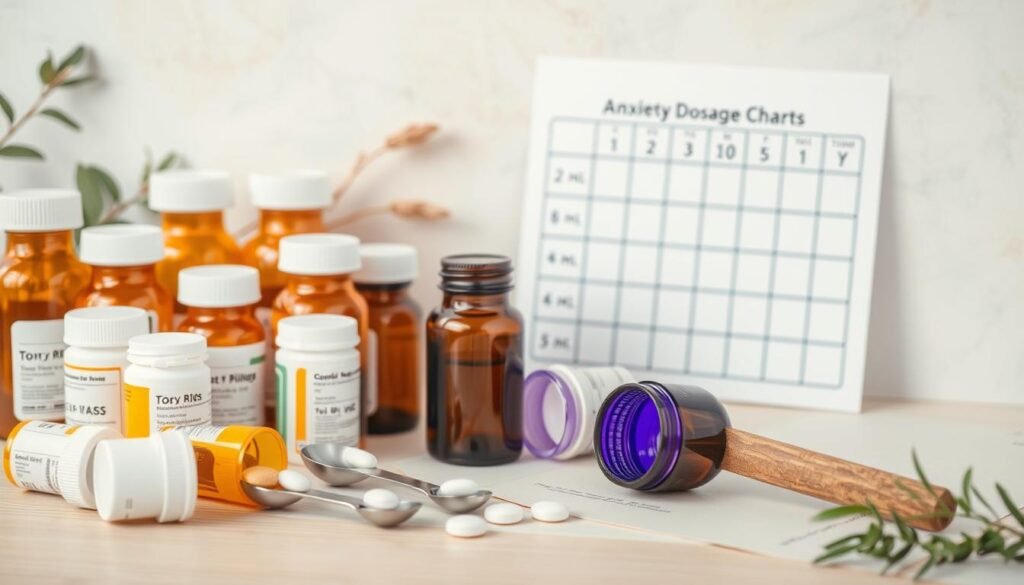Did you know nearly 40 million adults in the U.S. face anxiety disorders every year? Such a high number shows how much we need good treatments. Gabapentin, mainly approved for nerve pain and seizures, is now also used to treat anxiety. Even though there’s limited research, its popularity is growing because it can calm people down by acting like the brain chemical GABA.
In this article, we’ll look closely at how gabapentin can help with anxiety. We’ll discuss how well it works, how much to take, the possible side effects, and other treatment options. Knowing about gabapentin’s role in treating anxiety is key for those who struggle with it.
Key Takeaways
- Gabapentin is commonly prescribed off-label for anxiety treatment.
- It mimics GABA, a neurotransmitter that promotes calmness in the brain.
- Common side effects include dizziness, fatigue, and mood changes.
- Initial improvement in anxiety symptoms may occur within three weeks.
- Gabapentin may be used when traditional anxiety medications are ineffective.
- Consultation with healthcare professionals is crucial for proper usage.
Understanding Gabapentin
Gabapentin, known by names like Neurontin and Gralise, is mainly an anticonvulsant. It was first approved to treat seizures but now also manages nerve pain. Its use has expanded to treat other conditions as part of prescription neuropathic medications.
Doctors sometimes prescribe it for anxiety, showing the need to understand gabapentin well. It may not be the top choice for anxiety, but it’s useful for those who don’t benefit from usual treatments.
Gabapentin comes in different forms like tablets, capsules, and liquid. Tablet doses range from 300 to 800 milligrams. The liquid form has 250 milligrams in every 5 milliliters. There are also extended-release versions for lasting effects.
While most people tolerate gabapentin well, some may experience side effects. These can include tiredness, dizziness, and headaches, which may affect daily life. It’s important to talk to a doctor about any other meds to avoid unsafe mixtures.
The off-label use of gabapentin means doctors and patients need to work closely. This ensures it’s used safely and effectively. With ongoing studies, our understanding and use of gabapentin in treating anxiety and other issues will improve.
What is Gabapentin and How Does It Help Anxiety?
Gabapentin is known for treating nerve pain and seizures. But, it’s also used for anxiety disorders. This makes many wonder how it aids anxiety. Studies found it helps with conditions like social anxiety and severe panic disorder. This is key for those who don’t find relief in standard anti-anxiety drugs.
Many see their anxiety improve within weeks on gabapentin. Though not FDA-approved for anxiety, its positive effects are noted. It stands as an option for those not helped by common medications like SSRIs and benzodiazepines.
Side effects like drowsiness and dizziness are common with gabapentin. Knowing these is important when starting. With a doctor’s help, these side effects can be managed. This lets patients enjoy gabapentin’s benefits.
Everyone reacts differently to gabapentin. This means treatment must be personalized. Consulting with a healthcare professional is key. For more on anti-anxiety drugs, reading about traditional meds offers more options. This helps in making informed choices.
Gabapentin is promising for tackling anxiety when other meds fail. This calls for more research and open talks with healthcare teams. Such discussions help patients understand their treatment better. They learn how gabapentin might manage their anxiety effectively.
How Gabapentin Works
Gabapentin is key in managing anxiety as a GABA analogue. It helps understand its impact on various anxiety disorders.
Mechanism of Action as a GABA Analogue
Gabapentin acts like the neurotransmitter GABA, known for its brain calming effects. It doesn’t attach to GABA receptors directly. Instead, it controls the neurotransmission process. This slows down brain activities, easing anxiety symptoms.
Impact on Neurotransmission and Anxiety
Gabapentin changes how neurotransmitters communicate, which is crucial. It lessens excitatory neurotransmitters, aiding in anxiety treatment. Studies show it calms brain activity, helping those who don’t benefit from standard treatments.
Improvements are often seen three weeks after starting. For more on similar medications, see this source.
Gabapentin’s role goes beyond treating seizures. Its use in anxiety helps many of the 300 million worldwide with anxiety disorders. This highlights the importance of exploring effective treatments like Gabapentin.
Taking Gabapentin for Anxiety
Gabapentin is now being looked at as a way to deal with anxiety disorders. It’s important to know the right dose and how to take it. This helps in getting the most out of the treatment with few side effects.
Dosing Guidelines and Administration
Treatment with gabapentin starts at a low dose, usually around 300 mg per day. This is to see how well it works and how it’s tolerated. Doctors may increase the dose slowly to help with symptoms. A daily dose of 900 mg or more can really help reduce anxiety.
Importance of Following Prescription Directions
Following the dosing instructions for gabapentin is key to its success in treating anxiety. Taking it regularly helps keep the right amount of medicine in the body. Stopping gabapentin suddenly can cause withdrawal or the return of anxiety. It’s important to keep in touch with doctors. They can watch your progress and adjust the dose if needed.

Potential Side Effects of Gabapentin
Gabapentin, known as Neurontin, is mostly safe to use. However, knowing the possible Gabapentin side effects is crucial. Users might face mild or severe symptoms. Knowing these helps ensure a safer use of the medication.
Common Side Effects to Monitor
Some users notice common side effects with gabapentin use. These can include:
- Drowsiness
- Dizziness
- Headaches
- Anxiety
- Memory problems
- Gastrointestinal issues like nausea and vomiting
These symptoms often are mild but can disrupt daily activities. In cases, side effects like unsteadiness or eye movement issues might show up. If these occur, getting medical help right away is vital. For more on long-term effects, visit this link.
Rare but Serious Side Effects
Although many side effects are mild, some rare, serious side effects of gabapentin exist. These can be:
- Suicidal thoughts
- Hallucinations
- Severe allergic reactions, including skin rashes and trouble breathing
- Unexpected muscle pain and extreme tiredness
- Kidney problems
- Weight gain from fluid retention
- Mood or behavior changes in children, like aggression
Patients must watch for these serious symptoms and seek help immediately if they appear. Long-term misuse of gabapentin can lead to dependency and withdrawal issues. This highlights the need for medical advice during treatment.
| Common Side Effects | Serious Side Effects |
|---|---|
| Drowsiness | Suicidal thoughts |
| Dizziness | Hallucinations |
| Headaches | Severe allergic reactions |
| Anxiety | Kidney abnormalities |
| Nausea and vomiting | Fluid retention |
Effectiveness of Gabapentin for Anxiety
Gabapentin has caught the eye of doctors for anxiety treatment. Though not officially approved for anxiety, its positive effects have been seen in emerging studies and case studies related to gabapentin and anxiety. These studies are especially relevant for those who don’t find standard medicines helpful. Getting to know gabapentin better can help both patients and healthcare workers make informed choices.
Research Insights and Case Studies
Large-scale studies on gabapentin are few, but smaller ones offer hope. They show it may help control anxiety, especially in people with generalized anxiety disorder (GAD) and panic disorders. One study with breast cancer survivors found gabapentin greatly eased their anxiety. This was particularly true for those who were more anxious. The amount of gabapentin needed can change a lot from person to person. It depends on factors like age, weight, and overall health. This affects how well gabapentin works to reduce anxiety.
Comparison with Traditional Anxiety Medications
Gabapentin is often looked at alongside gabapentin vs. traditional medications such as benzodiazepines and SSRIs. Medicines like alprazolam (Xanax) are known for quick anxiety relief. A study comparing gabapentin with Xanax found Xanax was better for sudden stress and anxiety before surgery. So, while gabapentin could be an option for those who haven’t benefited from standard treatments, it’s clear that traditional medicines are still the first choice for anxiety management.
| Medication Type | Effectiveness | Common Side Effects |
|---|---|---|
| Gabapentin | May reduce anxiety symptoms; effectiveness varies | Drowsiness, dizziness, headache, nausea, swelling |
| SSRIs (e.g., Fluoxetine) | Effective for long-term anxiety management | Insomnia, weight gain, sexual dysfunction |
| Benzodiazepines (e.g., Xanax) | Effective for immediate anxiety relief | Drowsiness, cognitive impairment, dependence |
Alternative Treatments for Anxiety Disorders
Anxiety disorders impact daily life greatly. Many seek treatment options beyond standard medications, which can have side effects. Using both medication and non-medication approaches could lead to better outcomes.
Other Prescription Medications
Several alternatives exist for managing anxiety. These include:
- Selective Serotonin Reuptake Inhibitors (SSRIs) – Often the first step, SSRIs need time to work.
- Serotonin-Norepinephrine Reuptake Inhibitors (SNRIs) – For those who don’t see results with SSRIs.
- Buspirone – A choice for generalized anxiety disorder, after trying SSRIs.
- Beta-blockers – Such as propranolol, target the physical signs of anxiety.
- Hydroxyzine – Sometimes used for anxiety relief but can make you sleepy.
Each medication has its own pros, cons, and side effects. Finding the right one involves talking to healthcare experts.
Non-Medication Approaches to Anxiety Management
There are key non-medication strategies for tackling anxiety. These strategies help in achieving overall well-being. They are:
- Cognitive Behavioral Therapy (CBT) – Helps change negative thoughts.
- Mindfulness and meditation – Focuses on relaxation and living in the moment.
- Lifestyle changes – Involves being active, eating well, and getting enough sleep.
- Support groups – They can make you feel less alone.
These methods, when combined with medication, can lead to a well-rounded care plan. Everyone’s experience with anxiety is unique, so it’s important to customize treatment.
| Treatment Type | Description | Examples | Effectiveness |
|---|---|---|---|
| Prescription Medications | Drugs for easing anxiety symptoms. | SSRIs, SNRIs, Buspirone | Effective, but side effects are possible. |
| Therapy | Psychological ways to understand and manage anxiety. | CBT, DBT | Works well for many people. |
| Lifestyle Changes | Changes in daily habits to lessen anxiety. | Exercise, diet, sleep routine | Good for mental health overall. |
| Support Systems | Being part of a community for emotional support. | Support groups | Greatly cuts down on feeling isolated. |
Gabapentin’s Off-Label Use in Psychiatry
Gabapentin is being used in new ways in psychiatry. It’s prescribed for conditions not officially approved by the FDA. This off-label use is important for treating different psychiatric disorders with gabapentin.
Understanding Off-Label Prescriptions
Healthcare providers are increasingly using gabapentin off-label. They base this on clinical judgment and new research. Although gabapentin is mainly for seizure control and neuropathic pain, it’s also used for anxiety and alcohol dependence. A review of 219 abstracts shows its importance in psychiatry.
Role in Treating Disorders Beyond Anxiety
Gabapentin may help with anxiety disorders, but more research is needed for generalized anxiety disorder. Its effectiveness in bipolar disorder is limited. However, it is better at managing alcohol cravings and withdrawal symptoms. This makes it a good additional treatment for opioid dependence. Yet, its effectiveness in treating depression, PTSD, obsessive-compulsive disorder, and other substance abuses is not proven.

| Condition | Effectiveness | Evidence Level |
|---|---|---|
| Anxiety Disorders | Limited | Not established |
| Bipolar Disorder | Less likely | Level II-2 or higher in a few studies |
| Alcohol Dependence | Clear efficacy | Clinical evidence supports |
| Opioid Dependence | Promising adjunctive | Emerging evidence |
| Depression | No clear benefit | Insufficient evidence |
The role of gabapentin in psychiatry is still evolving. The goal is to improve patient outcomes with informed clinical practices. Using gabapentin off-label helps understand its role in psychiatric care. It’s about finding the balance between safety and effectiveness for various conditions.
Who Should Consider Gabapentin?
Gabapentin might be useful for people with anxiety who haven’t found relief elsewhere. Deciding who should use gabapentin requires looking closely at the person’s specific situation.
Evaluating Patient History and Treatment History
Looking into a patient’s past treatments is key to see if gabapentin fits. This includes checking all past attempts to manage anxiety and mental health overall. If traditional methods like SSRIs or therapy haven’t worked, gabapentin could help.
Different factors come into play when thinking about gabapentin. It’s important to consider other conditions, how past medications worked, and personal health details. A doctor will think about:
- Anxiety disorders that haven’t improved with other treatments
- How the person responded to SSRIs and SNRIs before
- Whether they’ve tried therapy, like cognitive-behavioral therapy
- Any other mental health issues that could influence the plan
Gabapentin may also be part of a larger plan to improve mental health. This can include changes in lifestyle and therapy. Watching how the patient does on gabapentin closely is vital for success without bad side effects.
Consultation with Healthcare Professionals
Talking to healthcare pros is key when looking at gabapentin for managing anxiety. These experts are essential in giving the right dose, watching for side effects, and making sure everything works well with other treatments. By chatting with them, you get advice that fits your health needs and likes.
Importance of Professional Guidance
Getting advice from professionals is super important. They know how to tell if gabapentin is good for different anxiety issues like generalized anxiety disorder (GAD), social anxiety disorder (SAD), and panic disorder. They’ll guide you on the right amount to take, usually between 100 mg and 800 mg three times a day, depending on what you need. This way, you get the best help while keeping side effects like dizziness and sleepiness low.
Keeping in touch with your healthcare provider also means your treatment can change as needed. If you start feeling better or run into problems, they can tweak your plan. This shows just how vital professional guidance is for getting the most out of your treatment.

Conclusion
Gabapentin has shown it can be a good choice for treating anxiety, especially when usual medicines don’t work. It helps relieve anxiety symptoms well, offering hope to those needing new solutions. It’s different from other treatments because of how it works and its mild side effects.
But, talking to a doctor before starting gabapentin is key. It’s important to have a doctor’s advice and a careful treatment plan. This is because people react differently to it, as studies have shown. As doctors learn more about gabapentin, it could improve how we handle anxiety.
Knowing how gabapentin can help with anxiety adds to our treatment options. It’s essential for patients to discuss with their doctors. This ensures a complete approach to managing their mental health.